- Home
- Carolyn Wells
The Mystery Girl
The Mystery Girl Read online
Produced by Stephen Hutcheson, Mardi Desjardins and theOnline Distributed Proofreading Team at https://www.pgdp.net(This book was produced from scanned images of publicdomain material from the Google Print project.)
THE MYSTERY GIRL
BY CAROLYN WELLS _Author of "Vicky Van," "Raspberry Jam," &c._
PHILADELPHIA AND LONDON J. B. LIPPINCOTT COMPANY 1922
COPYRIGHT, 1922, BY J. B. LIPPINCOTT COMPANY PRINTED BY J. B. LIPPINCOTT COMPANY AT THE WASHINGTON SQUARE PRESS PHILADELPHIA, U. S. A.
TO HUBER GRAY BUEHLER A GRAVE AND REVEREND SEIGNEUR WHO POSSESSES THE ADDED GRACE OF A RARE TASTE IN MYSTERY STORIES
CONTENTS
CHAPTER PAGE I. A President-elect 9 II. Miss Mystery Arrives 28 III. Thirteen Buttons 47 IV. A Broken Teacup 65 V. The Tragedy 84 VI. An Incredible Case 103 VII. The Volume of Martial 121 VIII. Where is Nogi? 140 IX. A Love Letter 158 X. Who is Miss Mystery? 176 XI. The Spinster's Evidence 193 XII. Maurice Trask, Heir 212 XIII. The Truesdell Eyebrows 231 XIV. A Proposal 250 XV. Fleming Stone Comes 269 XVI. Miss Mystery's Testimony 287 XVII. Planning an Elopement 305 XVIII. Miss Mystery no Longer 322
THE MYSTERY GIRL
CHAPTER I A PRESIDENT-ELECT
Quite aside from its natural characteristics, there is an atmosphereabout a college town, especially a New England college town, that isunmistakable. It is not so much actively intellectual as passively awareof and satisfied with its own intellectuality.
The beautiful little town of Corinth was no exception; from itstree-shaded village green to the white-columned homes on its outskirts itfairly radiated a satisfied sense of its own superiority.
Not that the people were smug or self-conceited. They merely accepted thefact that the University of Corinth was among the best in the country andthat all true Corinthians were both proud and worthy of it.
The village itself was a gem of well-kept streets, roads and houses, andall New England could scarce show a better groomed settlement.
In a way, the students, of course, owned the place, yet there were manyfamilies whose claim to prominence lay in another direction.
However, Corinth was by all counts, a college town, and gloried in it.
The University had just passed through the throes and thrills of one ofits own presidential elections.
The contest of the candidates had been long, and at last the strife hadbecome bitter. Two factions strove for supremacy, one, the conservativeside, adhering to old traditions, the other, the modern spirit,preferring new conditions and progressive enterprise.
Hard waged and hard won, the battle had resulted at last in the electionof John Waring, the candidate of the followers of the old school.
Waring was not an old fogy, nor yet a hide-bound or narrow-minded backnumber. But he did put mental attainment ahead of physical prowess, andhe did hold by certain old-fashioned principles and methods, which he andhis constituents felt to be the backbone of the old and honoredinstitution.
Wherefore, though his election was an accomplished fact, John Waring hadmade enemies that seemed likely never to be placated.
But Waring's innate serenity and acquired poise were not disturbed byadverse criticism, he was a man with an eye single to his duty as he sawit. And he accepted the position of responsibility and trust, simply andsincerely with a determination to make his name honored among the list ofpresidents.
Inauguration, however, would not take place until June, and the monthsfrom February on would give him time to accustom himself to his newduties, and to learn much from the retiring president.
Yet it must not be thought that John Waring was unpopular. On thecontrary, he was respected and liked by everybody in Corinth. Even therival faction conceded his ability, his sterling character and hispersonal charm. And their chagrin and disappointment at his election wasfar more because of their desire for the other candidate's innovationsthan of any dislike for John Waring as a man.
Of course, there were some who candidly expressed their disapproval ofthe new president, but, so far, no real opposition was made, and it washoped there would be none.
Now, whether because of the exigencies of his new position, or merelybecause of the irresistible charms of Mrs. Bates, Waring expected to makethe lady his wife before his inauguration.
"And a good thing," his neighbor, Mrs. Adams, observed. "John Waringought to've been somebody's good-looking husband long ago, but a bachelorpresident of Corinth is out of all reason! Who'd stand by his side at thereceptions, I'd like to know?"
For certain public receptions were dearly loved by the citizens ofCorinth, and Mrs. Adams was one of the most reception-loving of all.
As in all college towns, there were various and sundry boarding houses,inns and hotels of all grades, but the boarding house of Mrs. Adams was,without a dissenting voice, acclaimed the most desirable and mosthomelike.
The good lady's husband, though known as "Old Salt," was by no means aseafaring man, nor had he ever been. Instead, he was a leaf on a branchof the Saltonstall family tree, and the irreverent abbreviation had beengiven him long ago, and had stuck.
"Yes, indeed," Mrs. Adams asserted, "we've never had a bachelor presidentof Corinth and I hope we never will. Mrs. Bates is a nice sweet-spokenlady, a widow of four years standing, and I do say she's just the one forDoctor Waring's wife. She has dignity, and yet she's mighty human."
Emily Bates was human. Not very tall, a little inclined to plumpness,with fair hair and laughing blue eyes, she was of a cozy, home-lovingsort, and her innate good nature and ready tact were unfailing.
At first she had resisted John Waring's appeal, but he persisted, untilshe found she really liked the big, wholesome man, and without muchdifficulty learned to love him.
Waring was distinguished-looking rather than handsome. Tall andwell-made, he had a decided air of reserve which he rarely broke through,but which, Emily Bates discovered, could give way to confidences showingdepths of sweetness and charm.
The two were happily matched. Waring was forty-two and Mrs. Bates half adozen years younger. But both seemed younger than their years, andretained their earlier tastes and enthusiasms.
Also both were bound up, heart and soul, in the welfare of theUniversity. Mrs. Bates' first husband had been one of its prominentprofessors and its history and traditions were known and loved by thecheery little lady.
Perhaps the only person in Corinth who was not pleased at the approachingnuptials of John Waring and Emily Bates was Mrs. Peyton, Waring's presenthousekeeper. For it meant the loss of her posit
ion, which she hadfaithfully filled for ten years or more. And this meant the loss of agood and satisfactory home, not only for herself, but for her daughterHelen, a girl of eighteen, who lived there also.
Not yet had Waring told his housekeeper that she was to be dethroned butshe knew the notice would come,--knew, too, that it was delayed onlybecause of John Waring's disinclination to say or do anything unwelcometo another. And Mrs. Peyton had been his sister's school friend and hadserved him well and faithfully. Yet she must go, for the incomingmistress needed no other housekeeper for the establishment than her ownefficient, capable self.
It was a very cold February afternoon, and Mrs. Peyton was serving tea inthe cheerful living-room. Emily Bates was present; an indulgence sheseldom allowed herself, for she was punctilious regarding conventions,and Corinth people, after all, were critical. Though, to be sure, therewas no harm in her taking tea in the home so soon to be her own.
The two women were outwardly most courteous, and if there was anunderlying hostility it was not observable on the part of either.
"I came today," Emily Bates said, as she took her tea cup from theJapanese butler who offered it, "because I want to tell you, John, ofsome rumors I heard in the town. They say there is trouble brewing foryou."
"Trouble brewing is such a picturesque phrase," Waring said, smilingidly, as he stirred his tea. "One immediately visions Macbeth's witches,and their trouble brew."
"You needn't laugh," Emily flashed an affectionate smile toward him,"when the phrase is used it often means something."
"Something vague and indefinite," suggested Gordon Lockwood, who wasWaring's secretary, and was as one of the family.
"Not necessarily," Mrs. Bates returned; "more likely something definite,though perhaps not very alarming."
"Such as what?" asked Waring, "and from what direction? Will the freshmenmake me an apple-pie bed, or will the seniors haze me, do you think?"
"Be serious, John," Mrs. Bates begged. "I tell you there is a movement onfoot to stir up dissension. I heard they would contest the election."
"Oh, they can't do that," Lockwood stated; "nor would anybody try. Don'tbe alarmed, Mrs. Bates. I'm sure we know all that's going on,--and Ican't think there's any 'trouble brewing' for Doctor Waring."
"I've heard it, too," vouchsafed Mrs. Peyton. "It's not anythingdefinite, but there are rumors and hints, and where there's smoke,there's bound to be fire. I wish you'd at least look into it, Doctor."
"Yes," agreed Emily Bates, "do look into it, John."
"But how can I?" Waring smiled. "I can't go from door to door, saying'I've come to investigate a rumor,' can I?"
"Oh, don't be absurd!" Mrs. Bates' plump little hands fluttered inprotest and then fell quietly to rest in her lap. "You men are sotactless! Now, Mrs. Peyton or I could find out all about it, without anyone knowing we were making inquiry."
"Why don't you, then?" asked Waring, and Mrs. Peyton gave a pleased smileas the guest bracketed their names.
"I will, if you say so." Emily spoke gravely. "That is what I wanted toask you. I didn't like to take up the matter with any one unless youdirectly approved."
"Oh, go ahead,--I see no harm in it."
"But, Doctor Waring," put in Lockwood, "is it wise? I fear that if Mrs.Bates takes up this matter she may get in deeper than she means orexpects to, and--well, you can't tell what might turn up."
"That's so, Emily. As matters stand, you'd best be careful."
"Oh, John, how vacillating you are! First, you say go ahead, and then yousay stop! I don't mind your changing your opinions, but I do resent yourpaying so little attention to the matter. You toss it aside withoutthought."
"Doctor Waring thinks very quickly," said Mrs. Peyton, and Emily gave hera slight stare.
It was hard for the housekeeper to realize that she must inevitably loseher place in his household, and the thought made her a little assertivewhile she still had opportunity.
"Yes, I know it," was the reply Emily gave, and went on, addressingherself to the two men.
"Persuade him, Mr. Lockwood. Not of his duty, he never misapprehendsthat, but of the necessity of looking on this matter as a duty."
"What a pleader you are, Emily," and Waring gave her an admiring bow; "Iam almost persuaded that my very life is in danger!"
"Oh, you won't be good!" The blue eyes twinkled but the rosy little mouthtook on a mutinous pout. "Well, I warn you, if you don't look out foryourself, I'm going to look out for you! And that, as Mr. Lockwood hints,may get you into trouble!"
"What a contradictory little person it is! In an effort to get me out oftrouble, you admit you will probably get me into trouble. Well, well, ifthis is during our betrothal days, what will you do after we aremarried?"
"Oh, then you'll obey me implicitly," and the expressive hands indicatedwith a wide sweep, total subjection.
"You'll find him not absolutely easy to manage," Mrs. Peyton declared,and though Emily Bates said no word, she gave a look of superior managingpower that brought the housekeeper's thin lips together in a resentfulstraight line.
This byplay was unnoticed by large-minded John Waring, but it amusedLockwood, who was an observer of human nature.
Unostentatiously, he watched Mrs. Peyton, as she turned her attention tothe tea tray, and noted the air of importance with which she continuedher duties as hostess.
"Bring hot toast, Ito," she said to the well-trained and deferentialJapanese. "And a few more lemon slices,--I see another guest coming."
She smiled out through the window, and a moment later a breezy young chapcame into the room.
"Hello, folkses," he cried; "Hello, Aunt Emily."
He gave Mrs. Bates an audible kiss on her pretty cheek and bowed withboyish good humor to Mrs. Peyton.
"How do you do, Uncle Doctor?" and "How goes it, Lock?" he went on, as hethrew himself, a little sprawlingly into an easy chair. "And here's thefair Helen of Troy."
He jumped up as Helen Peyton came into the room. "Why, Pinky," she said,"when did you come?"
"Just now, my girl, as you noted from your oriel lattice,--and camerunning down to bask in the sunshine of my smiles."
"Behave yourself, Pinky," admonished his aunt, as she noted Helen's quickblush and realized the saucy boy had told the truth.
Pinckney Payne, college freshman, and nephew of Emily Bates, was veryfond of Doctor Waring, his English teacher, and as also fond, in hisboyish way, of his aunt. But he was no respecter of authority, and, nowthat his aunt was to be the wife of his favorite professor, also thePresident-elect of the college, he assumed an absolute familiarity withthe whole household.
His nickname was not only an abbreviation, but was descriptive of hisexuberant health and invariably red cheeks. For the rest, he was just arollicking, care-free boy, ring leader in college fun, often punished,but bobbing up serenely again, ready for more mischief.
Helen Peyton adored the irrepressible Pinky, and though he liked her, itwas no more than he felt for many others and not so much as he had for afew.
"Tea, Mrs. Peyton? Oh, yes, indeed, thank you. Yes, two lemon and threesugar. And toasts,--and cakies,--oh, what good ones! What a tuck! AlmaMater doesn't feed us like this! I say, Aunt Emily, after you aremarried, may I come to tea every day? And bring the fellows?"
"I'll answer that,--you may," said John Waring.
"And I'll revise the answer,--you may, with reservations," Mrs. Batessupplemented. "Now, Pinky, you're a dear and a sweet, but you can't annexthis house and all its affairs, just because it's going to be my home."
"Don't want to, Auntie. I only want you to annex me. You'll keep the samecook we have at present, won't you?"
He looked solicitously at her, over a large slice of toast and jam he wasdevouring.
"Maybe and maybe not," Mrs. Peyton spoke up. "Cooks are not alwaysanxious to be kept."
"At any rate, we'll have a cook, Pinky, of some sort," his aunt assuredhim, and the boy turned to tease Helen Peyton, who was quite willing tobe teased.<
br />
"I saw your beau today, Helen," he said.
"Which one?" she asked placidly.
"Is there a crowd? Well, I mean the Tyler person. Him as hangs out at OldSalt's. And, by the way, Uncle President,--yes, I am a bit previous onboth counts, but you'll soon have the honor of being both President andmy uncle,--by the way, I say, Bob Tyler says there's something in thewind."
"A straw to show which way it blows, perhaps," Waring said.
"Perhaps, sir. But it's blowing. Tyler says there's a movement on foot tomake things hot for you if you take the Presidential chair with yourpresent intentions."
"My intentions?"
"Yes, sir; about athletics, and sports in general."
"And what are my so-called intentions?"
"They say, you mean to cut out sport--"
"Oh, Pinckney, you know better than that!"
"Well, Doctor Waring, some seem to think that's what you have in mind. Ifyou'd declare your intentions now,--"
"Look here, Pinky, don't you think I've enough on my mind in the matterof marrying your aunt, without bringing in other matters till that'ssettled."
"Going to be married soon, Uncle Doc?"
"We are. As soon as your aunt will select a pleasant day for theceremony. Then, that attended to, I can devote my mind and energies tothis other subject. And meanwhile, my boy, if you hear talk about it,don't make any assertions,--rather, try to hush up the subject."
"I see,--I see,--and I will, Doctor Waring. You don't want to bother withthose things till you're a settled down married man! I know just how youfeel about it. Important business, this getting married,--I daresay,sir."
"It is,--and so much so, that I'm going to take the bride-elect off rightnow, for a little private confab. You must understand that we have muchto arrange."
"Run along,--bless you, my children!" Pinky waved a teacup and a sandwichbeneficently toward the pair, as they left the room and went off in thedirection of the Doctor's study.
The house was a large one, with a fine front portico upheld by sixenormous fluted columns.
One of the most beautiful of New England doorways led into a wide hall.To the right of this was the drawing-room, not so often used and not sowell liked as the more cozy living-room, to the left as one entered, andwhere the tea-drinking group now sat.
Behind these two rooms and hall, ran a cross hall, with an outer door atthe end back of the living-room and a deep and wide window seat at theother end, behind the drawing-room.
Further back, beyond the cross hall, on the living-room side, was thedining-room, and beside it, back of the drawing-room was the Doctor'sstudy. This was the gem of the whole house. The floor had been sunken togive greater ceiling height, for the room was very large, and of fineproportions. It opened on to the cross hall with wide double doors, and aflight of six or seven steps descended to its rug covered floor.
Opposite the double doors was the great fireplace with high over-mantelof carved stone. Each side of the mantel were windows, high and notlarge. The main daylight came through a great window on the right of theentrance and also from a long French window that opened like doors on thesame side.
This French window, giving on a small porch, and the door that openedinto the cross hall of the house were the only doors in the great room,save those on cupboards and bookcases.
On the other side of the room, opposite the French window was a row offour small windows looking into the dining-room. But these were high, andcould not be seen through by people on the sunken floor of the study.
The whole room was done in Circassian walnut, and represented the idealabode of a man of letters. The fireside was flanked with two facingdavenports, the wide window seat was piled with cushions. The Frenchwindow-doors were suitably curtained and the high windows were of trulybeautiful stained glass.
The spacious table desk was in the middle of the room, and bookcases,both portable and built in, lined the walls. There were a few good bustsand valuable pictures, and the whole effect was one of dignity and reposerather than of elaborate grandeur.
The room was renowned, and all Corinth spoke of it with pride. Thestudents felt it a great occasion that brought them within its walls andthe faculty loved nothing better than a session therein.
Casual guests were rarely entertained in the study. Only especialvisitors or those worthy of its classic atmosphere found welcome there.Mrs. Peyton or Helen were not expected to use it, and Mrs. Bates hadalready declared she should respect it as the sanctum of Doctor Waringalone.
The two made their way to the window seat, and as he arranged the softcushions for her, Waring said, "Don't, Emily, ever feel shut out of thisroom. As I live now, I've not welcomed the Peytons in here, but my wifeis a different proposition."
"I still feel an awe of the place, John, but I may get used to it.Anyway, I'll try, and I do appreciate your willingness to have me inhere. Then if you want to be alone, you must put me out."
"I'll probably do that, sometimes, dear, for I have to spend many hoursalone. You know, I'm not taking the presidency lightly."
"I know it, you conscientious dear. But, on the other hand, don't be tooserious about it. You're just the man for the place, just the characterfor a College President, and if you try too hard to improve orreconstruct yourself, you'll probably spoil your present perfection."
"Well nothing would spoil _your_ present perfection, my Emily. I am toogreatly blest,--to have the great honor from the college,--and you, too!"
"Are you happy, John? All happy?"
Waring's deep blue eyes fastened themselves on her face. His brown hairshowed only a little gray at the temples, his fine face was not toucheddeeply by Time's lines, and his clear, wholesome skin glowed with health.
If there was an instant's hesitation before his reply came, it was nonethe less hearty and sincere. "Yes, my darling, all happy. And you?"
"I am happy, if you are," she returned. "But I can never be happy ifthere is a shadow of any sort on your heart. Is there, John? Tell me,truly."
"You mean regarding this trouble that I hear is brewing for me?"
"Not only that; I mean in any direction."
"Trouble, Emily! With you in my arms! No,--a thousand times no! Troubleand I are strangers,--so long as I have you!"

 The Deep Lake Mystery
The Deep Lake Mystery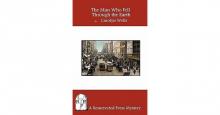 The Man Who Fell Through the Earth
The Man Who Fell Through the Earth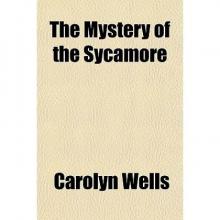 The Mystery of the Sycamore
The Mystery of the Sycamore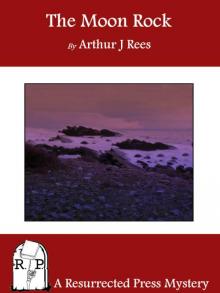 The Mystery Girl
The Mystery Girl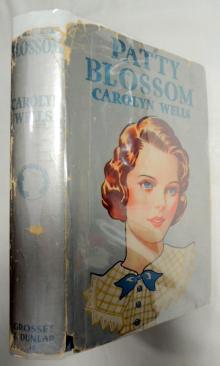 Patty Blossom
Patty Blossom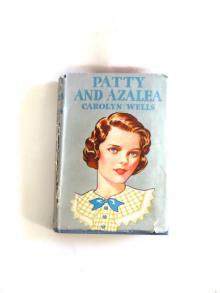 Patty and Azalea
Patty and Azalea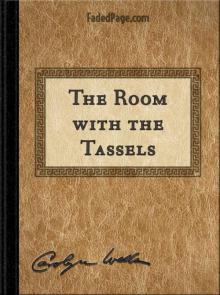 The Room with the Tassels
The Room with the Tassels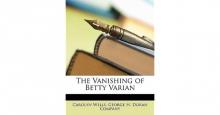 The Vanishing of Betty Varian
The Vanishing of Betty Varian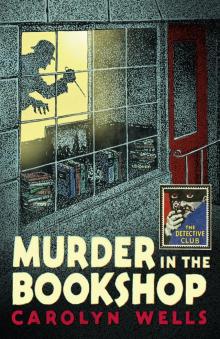 Murder in the Bookshop
Murder in the Bookshop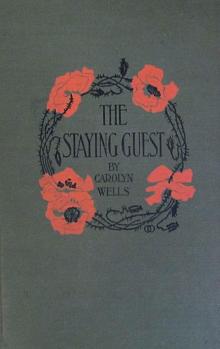 The Staying Guest
The Staying Guest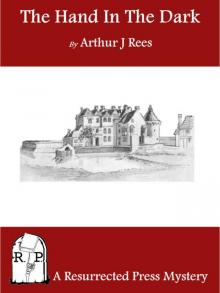 The Curved Blades
The Curved Blades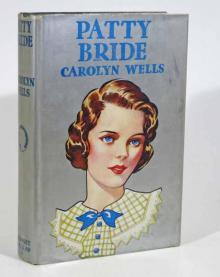 Patty—Bride
Patty—Bride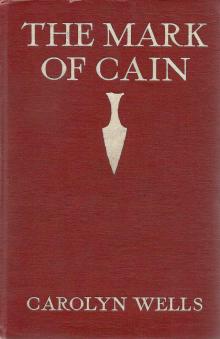 The Mark of Cain
The Mark of Cain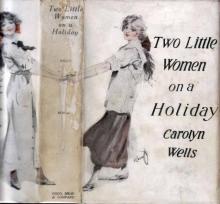 Two Little Women on a Holiday
Two Little Women on a Holiday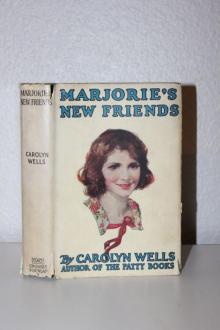 Marjorie's New Friend
Marjorie's New Friend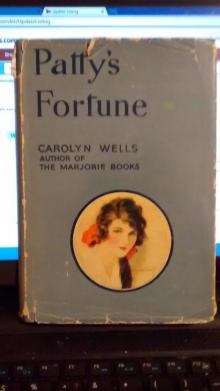 Patty's Fortune
Patty's Fortune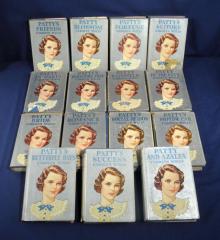 Patty's Social Season
Patty's Social Season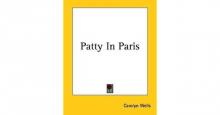 Patty in Paris
Patty in Paris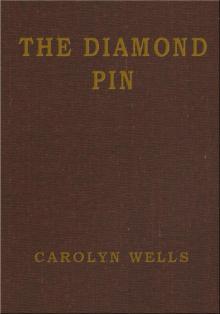 The Diamond Pin
The Diamond Pin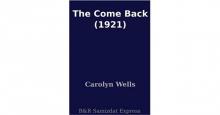 The Come Back
The Come Back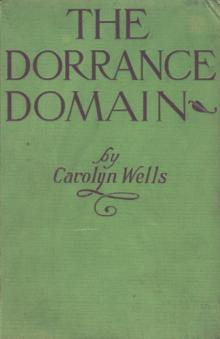 The Dorrance Domain
The Dorrance Domain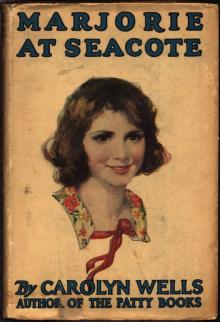 Marjorie at Seacote
Marjorie at Seacote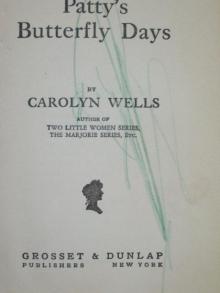 Patty's Butterfly Days
Patty's Butterfly Days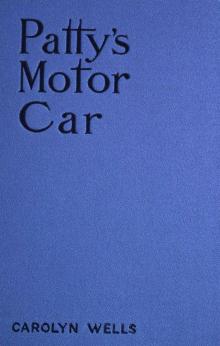 Patty's Motor Car
Patty's Motor Car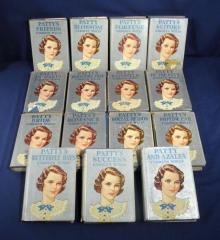 Patty's Success
Patty's Success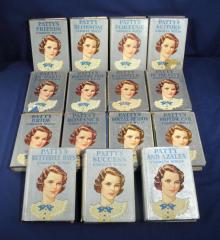 Patty's Suitors
Patty's Suitors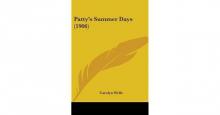 Patty's Summer Days
Patty's Summer Days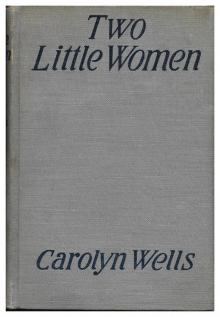 Two Little Women
Two Little Women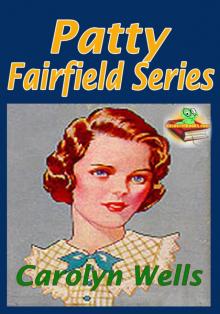 Patty Fairfield
Patty Fairfield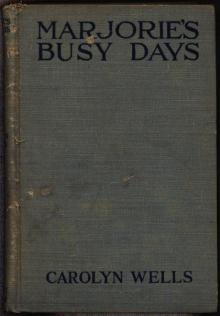 Marjorie's Busy Days
Marjorie's Busy Days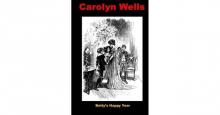 Betty's Happy Year
Betty's Happy Year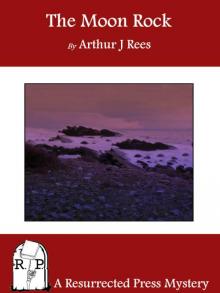 In the Onyx Lobby
In the Onyx Lobby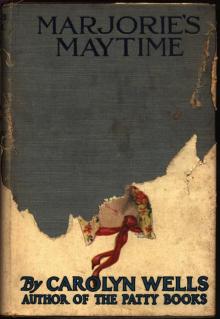 Marjorie's Maytime
Marjorie's Maytime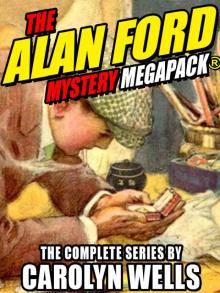 The Alan Ford Mystery MEGAPACK®
The Alan Ford Mystery MEGAPACK®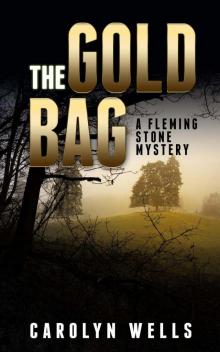 The Gold Bag
The Gold Bag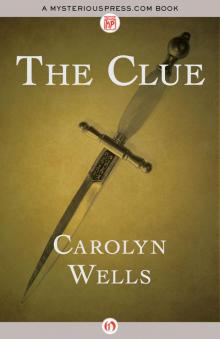 The Clue
The Clue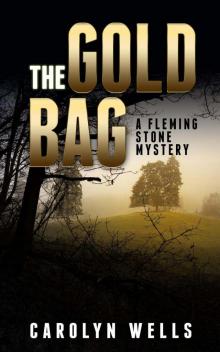 The Gold Bag : A Fleming Stone Mystery
The Gold Bag : A Fleming Stone Mystery